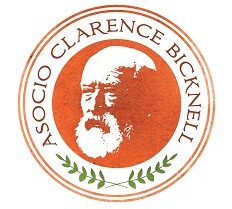HYMNS
It would seem evident at first glance that Clarence Bicknell, man of the church, would gravitate naturally towards writing hymns as a means of expression. However, as early as 1876 when Clarence was only 34 he began to have serious religious doubts. By 1880, within a year of settling in Bordighera, on the Italian Riviera, as chaplain to the Anglican Church, he renounced the church, abandoned wearing the dog collar and asked that he not be called Rev. He had never, to our knowledge, written any hymns during his time in the church, nor did he write them in English. He wrote them in Esperanto.
Dr. Zanenhof, an oculist in Warsaw, invented Esperanto some years later, in 1887. Clarence did not join the Esperanto movement until 1897, even if his interest must have been piqued earlier. Then there appears a considerable mass of work in Esperanto, some poems but many hymns; seven translations and one original in Adoru Kantante (1971), and nine texts in Adoru (2001). Some are still in use.
Clarence was respected by his fellow Esperantists. The obituary by Edmond Privat in the periodical Esperanto, which you can read in full in the attached pdf,, is eloquent and heart-felt. “Who will not have read some of his neatly crafted poems written originally in Esperanto and often sung at one or another of the events at which we come together? Generally, at Christmas or New Year, his friends would receive a lovely card, always with an appropriate verse, carefully embellished and, at the same time, thoughtful. Thus he gave us something of his noble spirit, which wished to know only the best in others and which contained a wealth of love concealed beneath a retiring modesty. His home in Bordighera remains an indelible memory for many of us who spent time there, next to the azure sea, surrounded by December roses. His guests would be already overjoyed with the welcome they received, but what a surprise when they entered that garden, forever in bloom, and went into the house: Esperanto through and through from cellar to roof. Our language was the only one to be heard there; everywhere were artefacts adorned with Esperanto symbols on vases, embroidery or cushions. It was life in an Esperanto paradise, with the external world excluded. Not that he forgot this other world: the poor children of the Italian town would testify to his constant charity. He served the language most valuably with translations and original pieces crafted always with care. He patiently read and generously corrected the many writings of others. As a member of the Language Committee 1 he promoted and faithfully respected the basic language principles laid down by Zamenhof. In all areas he proved to be a quiet but diligent worker and was, in fact, one of our most sagacious pioneers, to whom many would turn in a difficult hour. His memory, and our gratitude to him, will now remain most precious in our grieving hearts.”
Marcus Bicknell – March 2013
| Texts by Clarence Bicknell (6) | As | Instances |
| El multaj landoj kaj nacioj | Clarence Bicknell (Author) | 2 |
| Ho anĝeloj, la Sinjoron adoradu en ĉiel’ | Clarence Bicknell (Translator) | 2 |
| Ho! Kreinto de l’ homaro! | Clarence Bicknell (Author) | 2 |
| Nun estu Di’ laŭdata | Clarence Bicknell (Translator) | 2 |
| Patro nia, ni alvenis | Clarence Bicknell (Author) | 3 |
| Per unu kor’ kaj lingvo, bona Di’ | Clarence Bicknell (Author) | 2 |
Leland Bryant Ross writes…
Clarence contributed greatly to the first Esperanto collection of Christian hymns, “Ordo de Diservo”, 1907. http://www.hymnary.org/hymnal/OdDs1907 has the hymn section in page scans, and as you can see the first four hymns (not counting the “Doksologio”) are original works of his, and the fifth is one of his translations.
We are planning a symposium concerning Esperanto hymnody and hymnology, to be convened in Cambridge, England, during the last week of July, 2015, in conjunction with the joint meeting of the Hymn Society of Great Britain and Ireland, the Hymn Society of the US & Canada, and the Internationale Arbeitsgemeinschaft fur Hymnologie. Although the focus of the meeting will be more general than “Clarence Bicknell, himnoverkisto”, that is indeed the subject of a paper I am hoping to present there.
Leland Bryant Ross – January 2013. (American Baptist layman and hymnologist – Universala Esperanto-Asocio, Seattle, USA)

